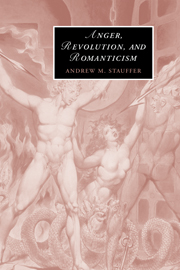Book contents
- Frontmatter
- Contents
- Acknowledgments
- List of abbreviations
- Introduction: fits of rage
- 1 Towards Romantic anger
- 2 Burke, Coleridge, and the rage for indignation
- 3 Inflammatory reactions
- 4 Provocation and the plot of anger
- 5 Shelley and the masks of anger
- 6 Byron's curse
- Epilogue
- Notes
- Bibliography
- Index
- CAMBRIDGE STUDIES IN ROMANTICISM
3 - Inflammatory reactions
Published online by Cambridge University Press: 22 September 2009
- Frontmatter
- Contents
- Acknowledgments
- List of abbreviations
- Introduction: fits of rage
- 1 Towards Romantic anger
- 2 Burke, Coleridge, and the rage for indignation
- 3 Inflammatory reactions
- 4 Provocation and the plot of anger
- 5 Shelley and the masks of anger
- 6 Byron's curse
- Epilogue
- Notes
- Bibliography
- Index
- CAMBRIDGE STUDIES IN ROMANTICISM
Summary
In December of 1777, Charles James Fox addressed the House of Commons in the following manner:
For the two years that a certain noble lord has presided over American affairs, the most violent, scalping, tomahawk measures have been pursued: – bleeding has been his only prescription. If a people deprived of their ancient rights are grown tumultuous – bleed them! If they are attacked with a spirit of insurrection – bleed them! If their fever should rise into rebellion – bleed them, cries this state physician! More blood! More blood! Still more blood!
In Fox's terms, tumult, insurrection, and rebellion (i.e., manifestations of the people's anger) have called forth a monoideistic program of therapy from George III's secretary of state for the colonies, Lord Germain. Bleeding, here a synecdoche for military repression, is metaphorically related to bloodletting as an anti-inflammatory remedy for fever. Explicitly mixing the rhetoric of revolutionary politics with that of medical therapeutics, Fox enacts a common trope of discourse that would achieve new urgency in the half-century following the American Declaration of Independence. It was during this period – that is, during the Romantic era – that the anger of the people assumed political legitimacy (in addition to mere efficacy), demanding from the ruling classes ideological resistance or capitulation (in addition to mere struggle or flight).
- Type
- Chapter
- Information
- Anger, Revolution, and Romanticism , pp. 64 - 86Publisher: Cambridge University PressPrint publication year: 2005

